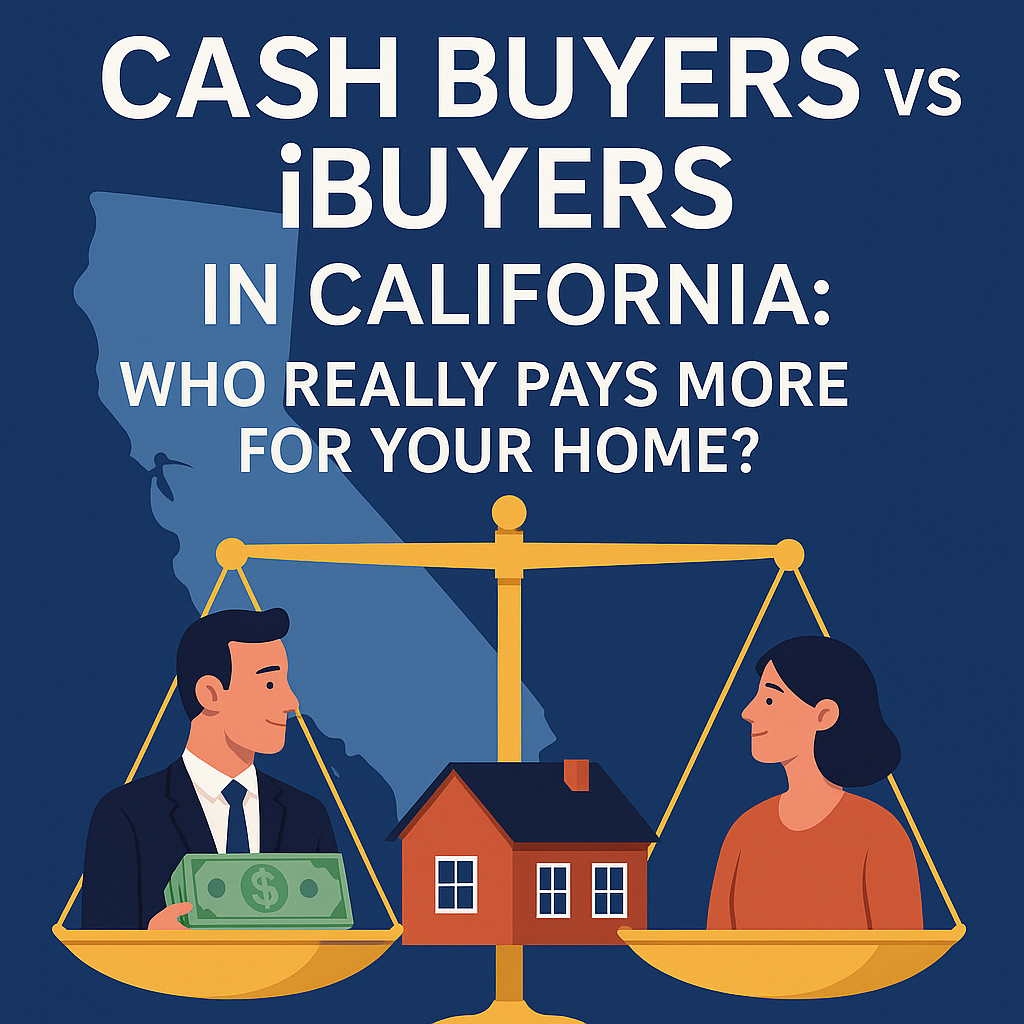Cash Buyers vs iBuyers: Who Pays More in California?
Updated:
California offers two fast lanes when you want to sell without drama: cash buyers and iBuyers. On a glossy landing page, they sound similar—quick offers, minimal showings, “convenience.” The truth lives in the math: what matters most is your net after fees, repair credits, timing, and paperwork friction. This long-form guide walks you through the trade-offs with practical checklists, side-by-side tables, working examples, and careful links to authoritative sources.

Cash Buyers vs iBuyers: What’s the Difference?
The short version: cash buyers are investors (local, regional, or national) who purchase your home as-is with their own funds or committed capital. Because they’re not waiting on conventional loan underwriting, they can close quickly and structure possession to your reality—tenants, storage needs, or a post-closing rent-back. A strong cash buyer leans into messy but solvable files: liens, HOA balances, permit oddities, or inherited items.
iBuyers are tech-enabled companies offering online quotes and streamlined processes. They typically charge a service/platform fee and conduct an inspection. Post-inspection, they often request repair credits or price adjustments. After closing with you, they resell the home—often with light renovations—to retail buyers, which reintroduces appraisal, financing, and market-timing realities. iBuyer coverage is ZIP-specific and expands or contracts with market conditions.
Cash Buyer Snapshot
- Buys as-is, usually no repairs or showings.
- Flexible close (often 7–21 days) or on your date.
- Can work through liens, probate, code items, or tenants.
- Often covers most seller closing costs.
- High certainty—no conventional financing risk.
iBuyer Snapshot
- Online quote; standardized processes and fees.
- Inspection → repair requests/credits common.
- Coverage limited to specific metros/ZIPs.
- Must resell; exposed to appraisal & rate shocks.
- Certainty depends on downstream retail demand.
Consumer context: For big financial choices, consult trustworthy data: CFPB Mortgage Tools, Freddie Mac PMMS (Rates), FHFA House Price Index (CA), CAR Market Data.
Net Proceeds: The Only Number That Matters
Two offers can look close in headline price yet land miles apart after you account for everything: service fees, repair credits, closing costs you’re responsible for, and the carrying costs for every extra week you hold—mortgage interest (if any), property taxes, insurance, utilities, landscaping, HOA dues, and opportunity cost. California carrying costs can be meaningful; in some communities, HOA dues alone can shift your net by thousands if your sale drifts into another month.
Net proceeds are a simple equation: Offer – (fees + credits + your closing costs + carry + taxes). Because taxes are individual and nuanced (primary residence exclusion, basis, depreciation recapture on rentals), talk to your CPA and check the California Franchise Tax Board for state-level items. For federal topics, see the IRS.
Fees, Repairs & Credits: Side-by-Side
Here’s an illustrative comparison to show how a “higher” headline can net lower if fees and credits stack up. Numbers vary by county, property type, HOA, and demand—use these lines as a template for your own net sheet.
| Line | Cash Buyer | iBuyer | Comment |
|---|---|---|---|
| Headline Offer | $700,000 | $720,000 | iBuyer looks higher at first glance |
| Platform/Service Fee | $0 | -$18,000 (2.5%) | Varies by company & market |
| Repair Credit (post-inspection) | $0 (as-is) | -$12,000 | Negotiated; adds friction & delay |
| Closing Costs (title/escrow/transfer) | Buyer covers (often) | -$4,500 | Check local transfer taxes |
| Carrying Costs (extra ~45 days) | ~$0 (fast) | -$5,000 | Mortgage, taxes, utilities, HOA |
| Estimated Net | $700,000 | $680,500 | Net beats headline |
Important: iBuyer fees, terms, and ZIP coverage change. Verify on official websites like Opendoor and Offerpad. For market context, check NAR Research and BLS West Region.
Timing & Certainty: Appraisals and Delays
In competitive California metros, time can be the hidden line item. When an iBuyer resells to a financed buyer, appraisal and underwriting can elongate timelines or trigger renegotiations. Appraisal sensitivity increases when rates rise or comps lag. Because a direct cash buyer removes conventional financing from your sale, the risk of “surprise” delays is lower.
Rate and demand context: Freddie Mac PMMS, Redfin Data Center, Zillow Research, FHFA House Price Index (CA).
California Nuance: LA, Bay Area, Inland Empire, San Diego, Sacramento & More
California is a patchwork of micro-markets. A condo in Koreatown faces different rules and buyer pools than a 1970s ranch in the Placer foothills. This matters because net proceeds are hyper-local: transfer taxes, retrofit requirements, rent control overlays, HOA quirks, and city inspection programs can all nudge timelines and net.
- Los Angeles & Orange County: HOA prevalence for condos; specific retrofit/point-of-sale rules in some cities. See LA Department of Building and Safety.
- Bay Area: Market seasonality; local transfer taxes and robust disclosure norms. See San Francisco, Alameda County.
- Inland Empire & Central Valley: Affordability draws buyers; appraisal sensitivity can rise with rates. Portals: Riverside, Fresno.
- San Diego & Sacramento: Military/government demand in some pockets; water/energy retrofit variance. See San Diego, Sacramento.
Regulatory guardrails worth knowing: California DRE, CA Attorney General (Consumers), California Courts Self-Help.
Eligibility & Coverage: Where iBuyers Operate (and Where They Don’t)
iBuyer footprints change with cost of capital, inventory risk, and local conversion data. Coverage tears open in hot seasons, then narrows when macro shifts hit. Before you plan around an iBuyer, check their current ZIP pages and recent press rooms for coverage notes: Opendoor, Offerpad. For industry analysis, explore Mike DelPrete’s research.
If your case includes tenants, deferred maintenance, inherited items, or probate, expect an iBuyer to be more selective. A direct cash buyer can often buy now and resolve complexities with title and counsel after closing.
Your Decision Checklist & Net Sheets
Quick Checklist
- Do I truly need an as-is sale with no repairs, showings, or clean-outs?
- Is my date more valuable than squeezing the last 1–2% from the price?
- Are there liens, tenants, probate, or HOA items that limit buyer pools?
- What’s my net after fees, credits, closing items, carrying costs, and taxes?
- Am I inside an iBuyer coverage ZIP? If not, what’s Plan B?
How to Build Your Net Sheets
- Start with each headline offer (Cash vs iBuyer vs Listing).
- Subtract all platform/service fees and expected repair credits for each path.
- Add your closing costs exposure (title/escrow splits, transfer tax, recording, HOA resale packs).
- Model time to close and add carrying costs per day (mortgage interest, property tax per diem, insurance, utilities, HOA dues).
- Discuss taxes with your CPA (FTB + IRS). Don’t forget depreciation recapture if it’s a rental.
- Compare nets and circle the one that best balances money, time, and energy.
Quick Net Calculator (Private, On-Page Only)
Keep this simple: enter a headline offer and your best estimates for platform/fees, repair credits, closing costs you’ll pay, and expected carrying costs through closing. This runs entirely in your browser—no tracking, no storage.
Tip: Ask title to model two close dates. Per-diem interest and HOA prorations can move your net.
Frequently Asked Questions
Do cash buyers always pay less than iBuyers?
Will an iBuyer purchase my tenant-occupied property?
Can I sell during probate in California?
How many offers should I get?
Where can I verify consumer and market info?
Authoritative Resources & Further Reading
- California Department of Real Estate (DRE)
- California Association of REALTORS® — Market Data
- NAR — Research & Statistics
- Freddie Mac — PMMS Rates
- FHFA House Price Index — California
- BLS — West Region
- U.S. Census — ACS
- California Attorney General — Consumers
- California Courts — Self-Help
- Opendoor • Offerpad
- Mike DelPrete — iBuyer Industry Research
Browse Our State Guides
Don’t see your state? We still buy there — get an offer and we’ll confirm coverage.
Get My No-Obligation California Cash Offer
Fast, respectful, and private. We buy as-is—occupied or vacant—on your timeline. Submit below and you’ll see an instant on-page confirmation (no redirects).
Get a No-Obligation California Cash Offer
We’ll buy your California property as-is and close on your date. Fill this quick form to get a firm number.
Zero pressure. If listing clearly nets you more, we’ll tell you that.
Ready for a firm as-is offer?
No showings. No repairs. Close on your date anywhere in California. Get a side-by-side net sheet first—then decide.
Real-World Seller Insights
Fresh how-tos and market tips from Local Home Buyers USA.
